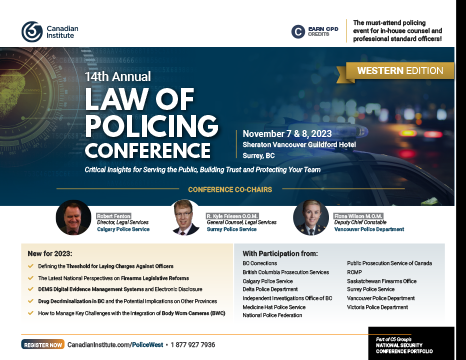2023 Agenda

Download 2023 Brochure
Flip through our 2023 conference brochure and discover what’s new this year.
- Jump to:
- At a Glance
- Day 1
- Day 2
- Print-friendly Format
Day 1 - Tuesday, November 7, 2023
Day 2 - Wednesday, November 8, 2023
Day 1 - Tuesday, November 7, 2023
| 7:45 |
Registration and Refreshments Served |
| 8:45 |
Opening Remarks from the Co-Chairs R. Kyle Friesen, O.O.M  Robert Fenton  Fiona Wilson, M.O.M |
| 9:00 |
A Look at BC and Alberta’s Police Act Amendments Katherine Murphy Moderator: R. Kyle Friesen, O.O.M |
| 9:30 |
The Real Threshold for Laying Charges Against Officers: Common Misconceptions and Clarifying What Does (and Doesn’t) Merit Charges David Butcher K.C.  Rob Farrer  Ryan Hira This session will look at the acquittal of former RCMP officer Edward Paul Mittelsteadt, the decision behind B.C. Prosecution Service to lay charges in February 2022, and the judge’s declaration of “insufficient evidence.” This panel will discuss the broader takeaways and special considerations affecting pending and future cases. This session will look at the following case law, including Rex vs. Mittelsteadt, Regina vs. Mason, 2022 BCPC 285, and Rex vs. Tsonos, 2022 BCPC 265. |
| 10:15 |
Networking Refreshment Break |
| 10:45 |
The Newest National Perspectives on Firearms Legislative Reforms-and Practical Takeaways Blaine R. Beaven
|
| 11:30 |
Responding to Frivolous and Vexatious Complaints and Proceedings Before Courts and Administrative Tribunals Robert Fenton Police departments are experiencing a rise in complaints resulting in civil action. Although not every complaint is thought to have validity, all complaints must receive a police response. Some complainants have the added complexity of a mental health challenge. This session will address complaints against police and municipalities resulting in civil matters as it pertains to self-represented litigants.
|
| 12:15 |
Networking Luncheon for Speakers and Delegates |
| 1:15 |
Interview: Effective Police Communication Strategies in the Wake of the Mass Casualty Report C/Supt. Darren Campbell M.O.M.
|
| 2:00 |
DIGITAL EVIDENCE MANAGEMENT PART IDEMS Digital Evidence Management Systems and Electronic Disclosure Sgt. Jim Ingram  Acting Inspector Christian Lowe
|
| 2:45 |
Networking Refreshment Break |
| 3:00 |
Roundtable Discussion on Emerging Charter Challenges Affecting Police Operations Oren Bick  S/Sgt. Mark McVicar
|
| 4:00 |
CASE STUDYAn Update on Surrey Municipal Police Transition Projects Norm Lipinski, O.O.M  R. Kyle Friesen, O.O.M  The Honourable Wally Oppal, K.C.  Melissa Granum, MBA BC’s Minister of Public Safety and Solicitor General announced in July 2023 that the City of Surrey will maintain a municipal police service and not revert back to an RCMP-only police service. This session will compare and contrast the transition plans, timelines and budgets:
|
| 4:45 |
Closing Remarks from the Co-Chairs. Conference Adjourns |
Day 2 - Wednesday, November 8, 2023
| 6:55 |
Registration and Refreshments Served |
| 7:55 |
Opening Remarks from the Co-Chairs |
| 8:15 |
Early Riser: Fostering Healthy Workplaces and Professional Wellness Brook Greenberg, K.C. Police recruitment and retention continues to be a top concern for departments across the country. Designed to assist legal counsel and police officers to detect, prevent or respond to substance abuse, mental health or stress-related issues affecting professional competence and the fulfillment of a lawyer’s ethical and professional duties. Join this early morning session as we focus on the impact on the quality of legal and law enforcement services provided to the public-and how to how to be a positive leader for your team, motivate your colleagues and prevent toxic atmospheres. |
| 9:15 |
A Year in Review of Drug Decriminalization in BC and the Potential Implications for Other Provinces Conor King  Fiona Wilson, M.O.M Following Health Canada’s approval of an exemption request, in January 2023, people in British Columbia can legally carry up to 2.5 g of fentanyl and other illegal drugs. This session will review the empirical evidence gathered since the implementation, and what can be gleaned for law enforcement operations and liability.
|
| 10:00 |
Networking Refreshment Break |
| 10:30 |
CASE STUDYEmerging Challenges with the Implementing and Scaling of Body Worn Cameras (BWC) Neil Dubord, O.O.M  Harj Sidhu, M.O.M Join this Frequently Asked Questions session as we delve into the implementation of Body Worn Cameras at Delta Police Department, due to enter its fourth stage of implementation in 2024. Hear success stories and lessons learned.
|
| 11:15 |
DIGITAL EVIDENCE MANAGEMENT PART IICrown Perspectives for Meeting Heightened Expectations for Digital Evidence Sharing and Integrity Nathan Buckham  Jim Hughes  Elizabeth O’Grady
|
| 12:00 |
Networking Luncheon |
| 1:00 |
Innovations in Investigative Techniques Insp. Michael Heard  Acting Inspector Brad Kline
|
| 1:45 |
The Real-Life Impact of the BC and Alberta Police Act Amendments: Perspectives on How They Will Change the Course of Police Conduct Disciplinary Hearings Kevin Westell  Robert Fenton
|
| 2:45 |
Networking Refreshment Break |
| 3:00 |
Clarifying the Latest Changes to Confidential Informants and Privilege in the Crime Stoppers Program Sgt. L.C. Lewis Stone  Sgt. Gina Horley
|
| 3:45 |
Navigating A Surge in Complaints and Parallel Complaints to Oversight Bodies Christine McLean  David T. McKnight This session will look at challenges arising from handling an increased number of complaints against police officers, as well as single complaints filed with multiple oversight bodies, and best practices for processing complaints.
|
| 4:30 |
Closing Comments from the Co-Chairs. Conference Concludes |